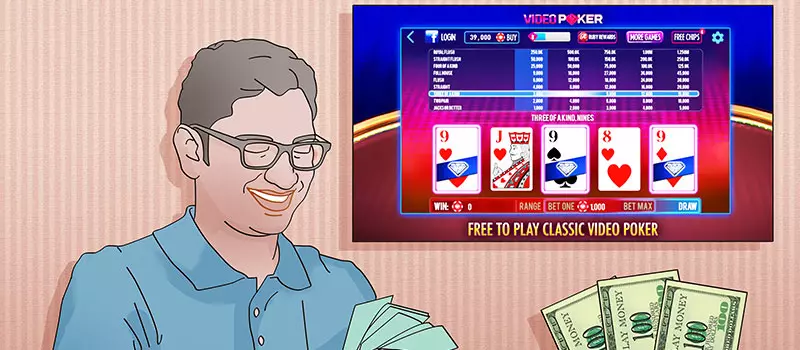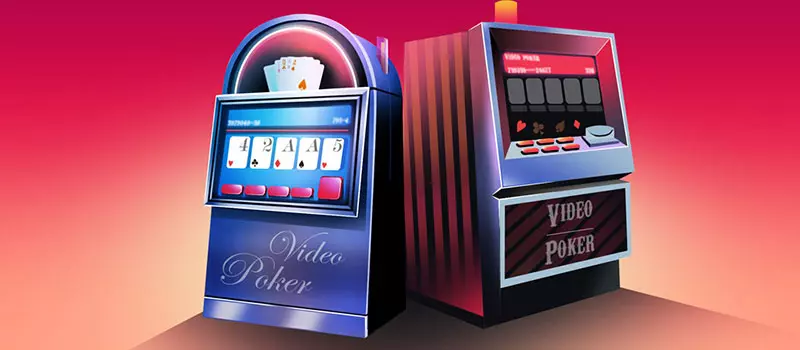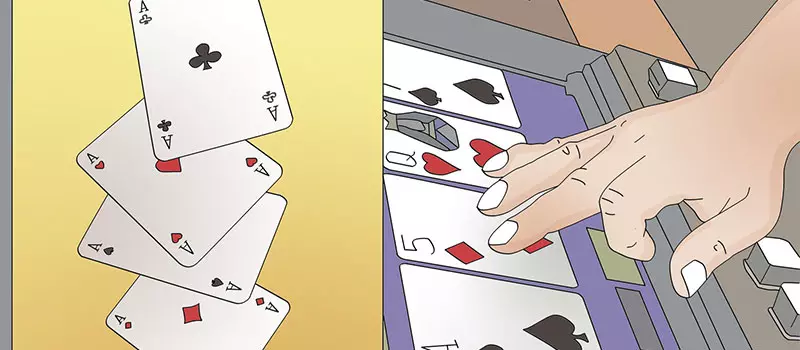Video poker may be one of the few casino games in which players can benefit from a very low house edge and a positive expected value. Yet thousands of players lose money betting on video poker on a daily basis and, more often than not, the reason for their poor performance is inadequate money management.
One cannot help but admit that money management is hardly fun – on the contrary, it can be rather tedious. At the same time, managing your bankroll wisely and, therefore, protecting your funds is essential.
This mainly applies to players who intend to emerge as winners not only at the end of their betting session but also in the long term. Money management may not be as exciting as playing the game itself, as it is a process that requires a great deal of dedication, patience, discipline and preparation.
You are probably asking yourself the following question – “Why is money management so important in video poker when the game offers such a low house edge?” The answer is simple enough.
Video poker is a game that involves a completely random process, so it is practically impossible to predict with certainty what will happen on the very next hand. Most video poker variations offer a payback that comes very close to 100%, but around 2% of this return is based solely on players collecting huge profits with royal flushes.
Now, considering that royal flushes appear, on average, once every 40,000 hands, players usually have a disadvantage of approximately 0.50% to 2%. Because of this, smart players tend to think of video poker as a “grind” game where one needs staying power in order to profit. Video poker may offer the lowest house edge of all casino games, yet players’ bankrolls should be well managed to carry them through until an advantageous trend comes their way.
Also, consider it from this perspective – gambling establishments have spent decades devising clever ways to protect their profits, so it certainly makes sense that players should do the same. If you want to be a successful video poker player, you should definitely consider following the few good money-management steps we recommend below.
Set a Separate Bankroll Aside and Split it into Equal Parts
Determining the amount of your bankroll for a given session is the best way to start, at least if you want your funds to last longer. Before you even begin playing video poker, you need to learn the number-one rule of gambling and abide by it – never gamble with money you cannot afford to lose.
This leads us to the second most important rule – never gamble with money you need to live on, such as the funds you use to pay your rent, car insurance or utility bills.
Some players even prefer to set up a separate bank account solely for gambling purposes. This is a great way to keep your personal funds and gambling bankroll separate and avoid gambling with money that should not be wagered on casino games.
Decide how much money you are comfortable investing in video poker and stick to that amount, come what may. Should you experience a bad streak and lose your entire bankroll, do not add more money in futile attempts to recoup your losses.
This is where discipline kicks in. In such cases, the smartest thing to do is to quit for the day, collect your thoughts and evaluate your gameplay to find the weak spots in your strategy.
So, how large should your video poker bankroll be? As we have said, video poker calls for staying power; that is, your bankroll should be large enough to carry you through until you hit a lucrative, high-ranking hand.
The denominations of the machine also need to be taken into account, but the general rule of thumb is that the session bankroll should be 50 to 100 times the stake you plan to make per hand. In other words, if you wish to play five coins at a £0.50 denomination per hand, your bankroll should be no less than £125 for this session, or 50 times the base betting unit of £2.50.
When your budget allows it, you may plan to engage in several betting sessions in a single month. If this is the case, it would be wiser to split the overall monthly bankroll into equal parts, depending on the number of sessions you plan. To proceed with our example, if you plan four betting sessions this month, you will need a monthly bankroll of at least £500.

Difference Between Long-Term and Short-Term Bankrolls
The bankroll you need to prepare will be affected by the amount of time you intend to dedicate to playing video poker. If you are planning a long-term bankroll, you will need to set aside funds that you can use on your favourite video poker games. This type of bankroll is more suitable for players who regularly bet on video poker.
If you plan to play on three or more days each month, you will definitely need a long-term bankroll to see you through. This means you must prepare enough funds to withstand the inevitable losing streaks that occur during long-term play. The long-term bankroll is more suitable for high rollers, as it requires a hefty amount in one’s bank account.
Recreational players, on the other hand, need funds for only a few sessions. If you play video poker once in a blue moon, you can settle for an amount you are comfortable risking during a short series of sessions.
If you have chosen a low-variance game like Jacks or Better for short-term play, you can stick to a bankroll that amounts to 10% of the money you plan to run through the game. This means you need to plan how long you will play; this will give you a rough idea of the number of hands you will play and the amount you will end up wagering.
For a high-variance game like Double Double Bonus Poker, the short-term bankroll should be around one-sixth of the money you plan to run through the game during the period you intend to play. Since high-variance games can cause bigger losses, even a short session requires a larger bankroll.
Of course, if you do not have much money to spare, you do not have to stick rigidly to the recommendations above. A smaller bankroll, however, will often lead to a shorter period of play and potential losses that could have been avoided with a larger bankroll.
Once you have settled on a bankroll for short-term play, you can split the amount across the number of sessions you intend to play. This will allow you to determine your bankroll for each session.
One thing worth mentioning about single-day sessions is that, if you play for longer, you will not need as much money as you might think. If you spend two hours on a 25-cent 9/6 Jacks or Better machine, the average loss for betting $1.25 per hand is estimated at about $5.75.
If you want to give yourself enough funds to play for two hours with a 5% risk of ruin, you will need a bankroll of around $165. If you decide to play for ten hours, this does not mean you must multiply your two-hour bankroll by five. Longer sessions smooth out losses, and you can settle for a bankroll of $450 instead of $825.
Set Win Goals and Loss Limits
Setting win goals and loss limits for your betting session is just as important as deciding on your bankroll size. It is always a good thing to know when to quit, regardless of whether you are winning or losing. We have already determined that you will need £500 per month and have broken this sum down into four betting sessions of £125 each. Next comes setting a win goal for yourself, with the recommended percentage being around 30% of your session bankroll, which corresponds to about £37 in our example.
In other words, you should quit when you have generated about £37 in profit. Another suitable course of action, if you feel a favourable trend is coming your way, is to follow the principle of guarantee and excess. In this case, you split your profits into equal halves and use one half to keep playing – this is your excess. The other half, about £18.50, is your guarantee, so leave this money alone and do not touch it.
You then continue betting, and with every subsequent profit of about £10 to £12, you set half of the sum aside as a guarantee and continue playing with the excess. This will enable you to reap the benefits of the favourable trend with zero risk to your bankroll. You are now practically playing with the house’s money. End the session as soon as you have no excess left to play with.
Setting a loss limit for yourself is equally important. Expert video poker players recommend a loss limit of around 60% of your bankroll for the session. In our case, you should quit playing as soon as you have lost £75 of your £125 bankroll. Whatever you do, do not chase your losses – this is the surest way to end up with empty pockets.

Adopt Optimal Strategy
The great thing about video poker is that the game is entirely beatable, provided that players adopt an adequate strategy that promotes optimal play. Without such a strategy, you might as well transition from video poker to slots. Strategic play in video poker means carefully evaluating the hand you receive on the deal and deciding which cards to hold and which to replace.
It makes sense that strategy changes depending on the video poker variation you play, with Jacks or Better, Tens or Better, Deuces Wild and Joker Poker being some of the most common options. In the beginning, it can be difficult to make good decisions after the deal. There is a solution, though – online you will find free video poker charts with strategies for all levels of skill and competence.
Print such a chart for your preferred video poker game and use it while playing from the comfort of your home. You can even play in practice mode without risking money until you get a proper feel for the game and learn to make your own decisions after the deal. Free play will also enable you to inspect your chart for inconsistencies without losing real money. Any chart with discrepancies in optimal play exceeding 0.10% is a no-go.
Video Poker Cards Generator
Expected Value and Expected Return
What Video Poker Games Pay Best
Tens or Better Video Poker
Jacks or Better
Keep a Journal with Your Betting Sessions’ Results
In addition to convenience, online casinos allow players to bet at a pace they find comfortable. Video poker, in particular, can be very dynamic, but beginners should steer clear of playing at a rapid pace. The best thing to do at the outset, until you get the hang of the game, is to use a notepad and pen when playing.
Write down the result of each hand, whether it is a win or a loss. You may also note your win goal and loss limit for the session at the top of the page.
This way, it will be easier to see how you progress during the session. For each hand, note the cards you receive on the deal, those you choose to hold, and the cards dealt after the draw. Record the amount of the bet and any profit generated.
In doing so, you can evaluate your gameplay, identify your weak spots and pinpoint any mistakes. Keeping such a journal will also enable you to detect favourable trends and bad streaks during the session itself. If you notice an unfavourable tendency, you can always call it quits for the day.
Go for High Value Games
Video poker may offer the lowest house edge you are likely to find in a casino, but it would be unwise to treat all variations of the game as equal. Not all games offer the same level of success and profitability, which is why the first thing players should consult when selecting a video poker variant is the paytable. In fact, this is one of the most crucial pre-play decisions you can make.
Whether a given game incorporates wild cards is also important because when these are introduced, there are usually massive swings in the odds of each hand you play, which, needless to say, is reflected in the payouts for all winning combinations. If you wish to increase your chances of turning a profit, you should play only the so-called “full-pay” machines.
These are easy to detect; all you need to do is check the payouts for a Full House and a Flush. A full-pay game of Jacks or Better offers payouts of 9 to 1 and 6 to 1 for a Full House and a Flush respectively.
Such a variation is usually called a 9/6 game. Any Jacks or Better game that offers smaller payouts for these two hands is considered a “short-pay” variation and should be avoided unless it is progressive. Each reduction of one unit in the payouts of these hands results in an increase in the game’s house edge.

Make Sure You Understand Doubling Up
Some video poker variations enable you to get more bang for your buck by taking advantage of the double-up functionality, also known as the gamble feature. It activates only after winning hands, and the player can choose to decline or accept it.
- Cards for the double-up feature are dealt off a fresh deck.
When you accept, the RNG deals you five random cards – one is exposed (the house’s card) and the other four are face down. The cards you initially drew to form your original winning hand are completely irrelevant in this case.
The five double-up cards are dealt from a fresh 52-card deck. It follows that both the house and the player have an equal chance of winning during this side game, which makes the double-up a fair bet – one of the few you will encounter at the casino.
- You must ascertain that your chosen video poker variant treats ties as pushes rather than player losses before you use the double-up functionality.
Your goal is to select a face-down card that beats the house’s exposed card. If you outdraw the casino with a higher card, the software doubles your original win. If you fail, you lose your entire profit from the last winning hand. If your chosen card is of the same denomination as the exposed card, most variations treat this as a tie, although some register it as a loss.

When to Double Up
Whether ties are considered pushes or result in a loss for the player is of utmost importance to your long-term results. Also, some variants allow you to use the feature only once per winning hand, while in others you can double up multiple times, usually up to ten. The feature is beneficial for players provided that:
- Ties between the house and the player result in a push rather than a loss for the player. When this is the case, the double-up feature offers a 100% theoretical return and carries no house edge whatsoever. In other words, the average long-term pay-back of the double-up is higher than that of the base game.
- The theoretical return of your chosen video poker variation is under 100%. If so, the double-up feature can help you boost the average payback percentage, which will ultimately save you money in the long run. In turn, this will increase the longevity of your bankroll and enable you to play video poker for longer.
When Not to Double Up
With that said, every coin has two sides, and the same applies to the double-up feature. There are instances when using this functionality is harmful to the player and is therefore not recommended. You should refrain from doubling up if:
- You have chosen a video poker variant that pays more than 100% over the long haul. One such game essentially gives you a small edge over the casino. Using the double-up feature in such variations will negate your edge to some degree and is therefore not worth the bother.
- The frequent use of the double-up feature leads to a dramatic increase in variance. While it is true that you can generate more winnings quickly with this feature, it is also true that it will cause you to lose more just as swiftly. Since the double-up bet is a 50/50 proposition, you will lose your initial win half of the time.
- Your chosen video poker variant treats ties between the house and the player as losses rather than as pushes. You are essentially up against a 5.8% house advantage in this case, which is obviously unacceptable. Doubling up can be extremely detrimental to your bankroll in such cases and you should avoid using it.
- If you play on a budget and are averse to risk, the double-up bet may not be such a good idea. You need a large enough bankroll to handle the higher variance associated with doubling up. Variance increases each time you use this function. The more often you intend to double up, the larger your bankroll should be.

Use Bonuses to Boost Your Bankroll
One of the easiest (and cheapest) ways to extend the duration of your session is to take advantage of the promotional incentives offered by online casinos. There are all sorts of bonuses you can claim, starting with the Welcome Bonus new players receive when they make their first deposit after registration.
It stands to reason that if you claim a £100 bonus after depositing the same amount and thus have £200 to play with, your chances of increasing your profits by hitting a high-ranking hand are greater.
You should, however, always be careful when claiming casino promotions. Make sure you read the terms and conditions that apply to bonuses and redeem an offer only if it is truly beneficial for video poker. Sometimes bonuses cannot be used on video poker, or, if you must meet wagering requirements, video poker may not fully contribute to the turnover of the bonus.
Slow Down Your Speed of Play
Video poker is an extremely dynamic game in which it is possible to play between 700 and 1,000 hands per hour. Of course, skill and experience also play a role, as less-seasoned players require more time to make a decision after the deal. Nevertheless, if you are a novice, the general recommendation is to play at a slower pace.
Slow play offers two significant benefits to video poker players. First, it enables you to make more sensible decisions after the deal, which translates into fewer deviations from your optimal strategy.
Additionally, even if you are betting on a full-pay game, sooner or later the house edge will have its say and you will end up losing money in the long run if you play as fast as you possibly can. Otherwise, the saying “The house always wins” would never have come into existence.
If you slow down a notch, you will lose money more slowly and your bankroll will last longer because you will simply play fewer hands per hour. This is common sense, yet many players still overlook it.
The bottom line is that you are not competing in a race, so make sure you take the time to make optimal decisions, both in regard to the game itself and to the money-management plan you have adopted.
Avoid Going Over Your Initial Budget
Your bankroll is the amount of money you have put aside specifically for playing casino games. One of the most commonly given tips is to set up a bankroll before you play any type of casino game, including video poker.
Once you have determined your budget, you should avoid betting more than you have decided to wager. Stay clear of your credit card or any ATM if you are playing at a land-based casino. This will not only interrupt your session but will also undermine the whole purpose of setting up a video poker bankroll.
If you lose your session bankroll, the best thing you can do is stop playing. Betting more money will, in many cases, only lead to even bigger losses. After all, gambling should be primarily a form of entertainment, and one should never chase their losses.



